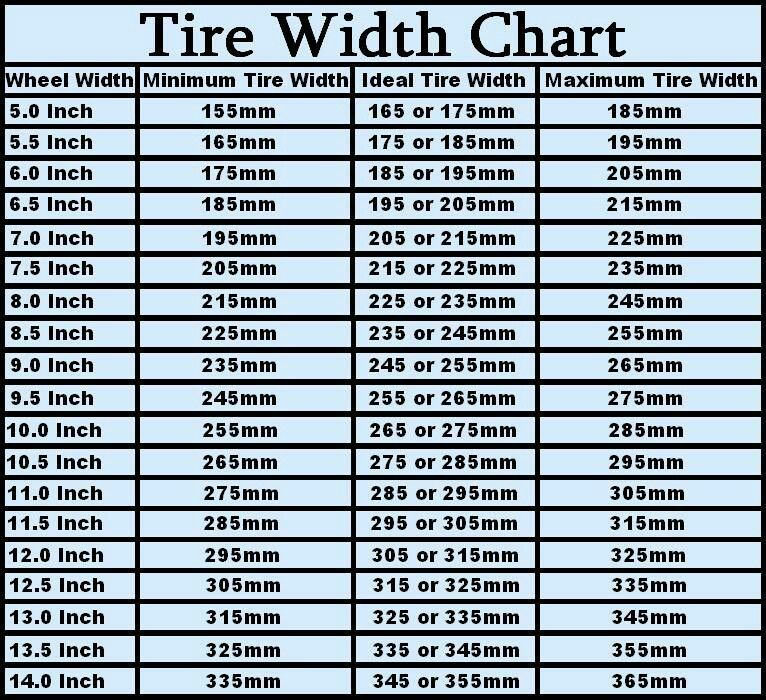Offroaders Staff Technical & Info
Offroaders.com Guide to P-Metric Tire Sizes, Conversion Chart and Tire Terminology – P-Metric to Inches
The following chart lists common p-metric tires sizes and the converted tread width and the actual tire height in inches. The values shown are calculated measurements based on the p-metric formula, which is explained below on this page. This chart is for an estimated conversion and the actual advertised tire height and tread width will vary from manufacturer to manufacturer. If you need to know the actual p-metric tire size and the equivalent measurements in inches for a specific tire, check with the manufacturer’s actual dimensions per individual tire brand before purchasing.
| Rim Size | P-Metric Size | Tread Width | Actual Tire Height |
| 15 Inch | 205/70R15 | 8. | 26.3 inches |
| 215/75R15 | 8.46 inches | 27.7 inches | |
| 235/75R15 | 9.25 inches | 28.9 inches | |
| 265/70R15 | 10.4 inches | 29.6 inches | |
| 16 Inch | 225/75R16 | 8.8 inches | 29.3 inches |
| 235/85R16 | 9.25 inches | 31.7 inches | |
| 245/75R16 | 9. 6 inches 6 inches | 30.5 inches | |
| 265/70R16 | 10.4 inches | 30.6 inches | |
| 265/75R16 | 10.4 inches | 31.6 inches | |
| 285/75R16 | 11.2 inches | 32.8 inches | |
| 305/70R16 | 12.0 inches | 32.8 inches | |
| 315/75R16 | 12.4 inches | 34.6 inches | |
| 345/75R16 | 13.6 inches | 36. 4 inches 4 inches | |
| 17 Inch | 235/65R17 | 9.25 inches | 29.0 inches |
| 245/70R17 | 9.6 inches | 30.5 inches | |
| 255/75R17 | 10.0 inches | 32.0 inches | |
| 255/80R17 | 10.0 inches | 33.0 inches | |
| 265/70R17 | 10.4 inches | 31.6 inches | |
| 275/70R17 | 10.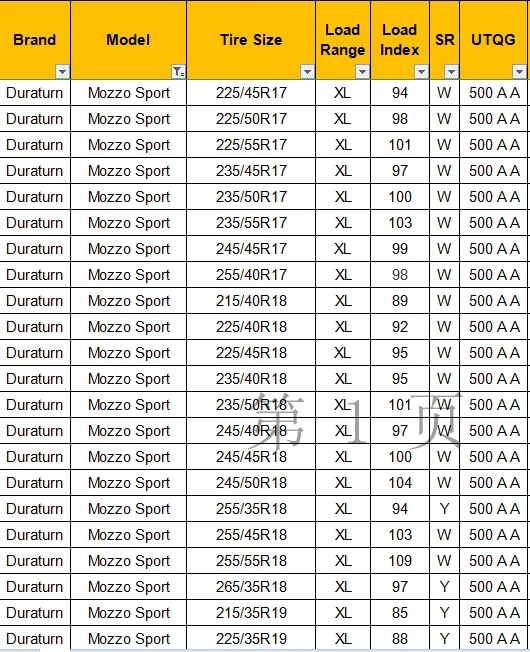 8 inches 8 inches | 32.2 inches | |
| 285/70R17 | 11.2 inches | 32.7 inches | |
| 285/75R17 | 11.2 inches | 33.8 inches | |
| 305/65R17 | 12.0 inches | 32.6 inches | |
| 315/70R17 | 12.4 inches | 34.4 inches | |
| 18 Inch | 265/60R18 | 10.4 inches | 30.5 inches |
| 275/65R18 |
10.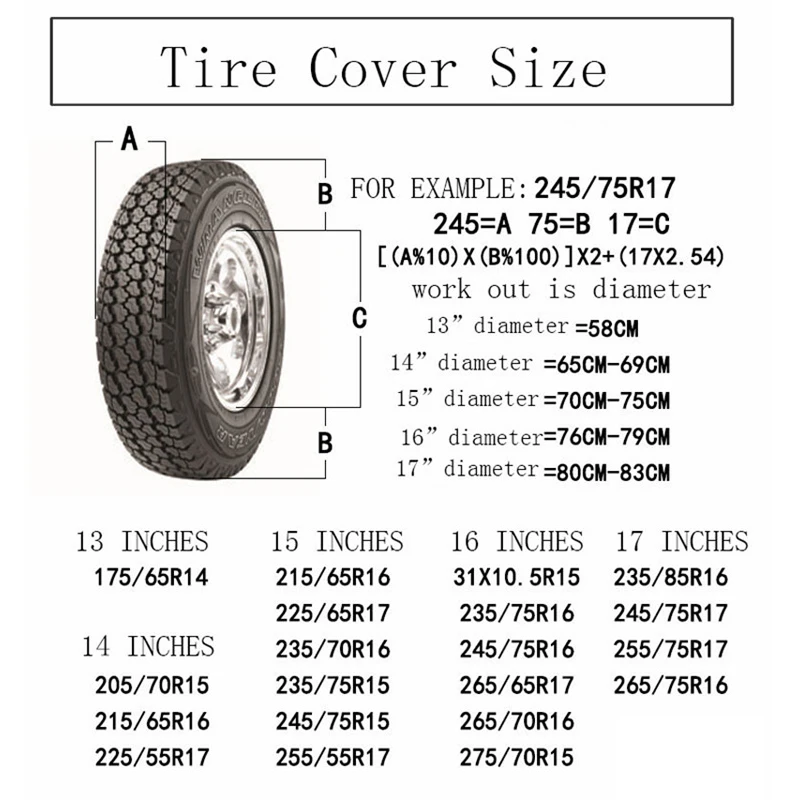 8 inches 8 inches | 32.1 inches | |
| 275/70R18 | 10.8 inches | 33.2 inches | |
| 285/75R18 | 11.2 inches | 34.8 inches | |
| 295/65R18 | 12.6 inches | 33.1 inches | |
| 305/60R18 | 12.0 inches | 32.4 inches | |
| 305/70R18 | 12.0 inches | 34.8 inches | |
| 20 Inch | 275/60R20 | 10.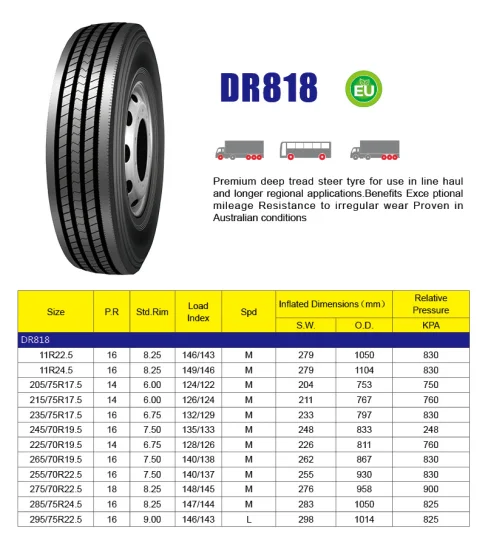 8 inches 8 inches | 33.0 inches |
| 275/65R20 | 10.8 inches | 34.0 inches | |
| 285/60R20 | 11.2 inches | 33.4 inches | |
| 285/65R20 | 11.2 inches | 34.5 inches | |
| 295/55R20 | 12.6 inches | 32.8 inches | |
| 295/60R20 | 11.6 inches | 33.9 inches | |
| 305/55R20 | 12.0 inches | 33. 2 inches 2 inches | |
| 325/60R20 | 12.8 inches | 35.3 inches |
Other 4×4 Related Calculators
▪ Convert P-Metric Tire to Inches
▪ Ring Pinion and Gear Ratio
▪ Speedometer Converter
▪ Find new Gear Ratio with new Tire Size
▪ Find Overall Crawl Ratio
▪ Find MPH
▪ Find RPM
▪ Convert P-Metric Tire to Inches
All tires are required to have certain information molded into the side of the tire in a location known as the sidewall. Some of the information is self explanatory while other information requires a little knowledge to decipher. The following will help you understand what this information means.
Tire Type – This Defines the intended proper use of the tire. P indicates this is a passenger car tire while LT indicates the tire would be for a light truck with a heavier load rating.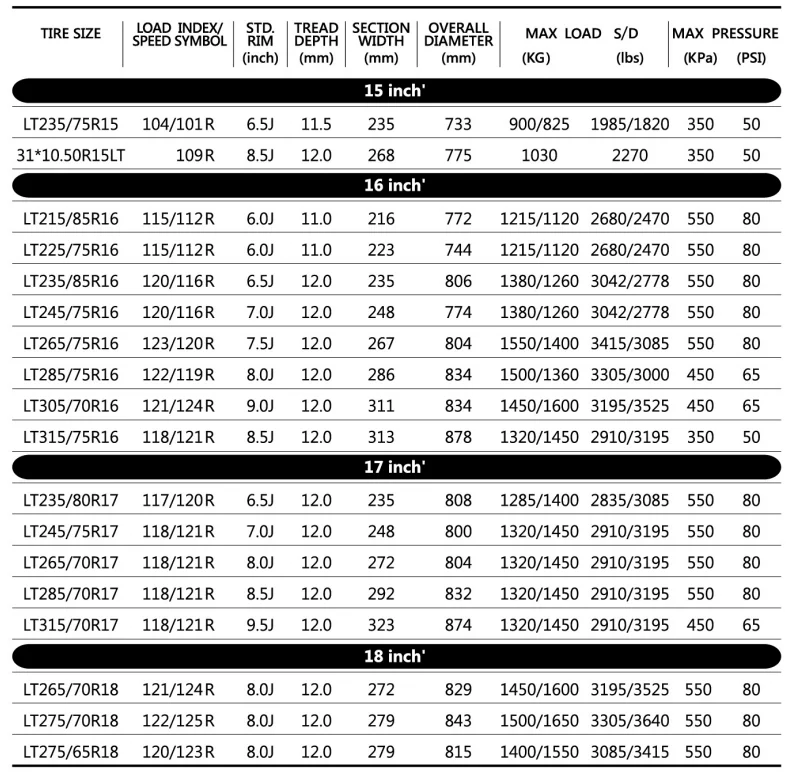
Tire Width – This is the width of the tire measured in millimeters from sidewall to sidewall. An example might be 215 representing 215 millimeters.
Aspect Ratio – This is the ratio of the height of the tire’s cross-section to its width. An example of this might be 65, which means that the height is equal to 65% of the tire’s width. To calculate the aspect ratio, multiple the first number (e.g. 215) by the second number with a decimal before the number (e.g. .65). Using the example numbers the tires aspect ratio would calculate as 215x.65=139.75 where 139.75 is the tires height in millimeters. This is the height of the rubber from rim to tread on one side of the tire.
To convert the aspect ratio to a full tire height in inches, do this:
Convert the above calculated tire height (aspect ratio) in millimeters to inches by multiplying the millimeters by .03937 (139.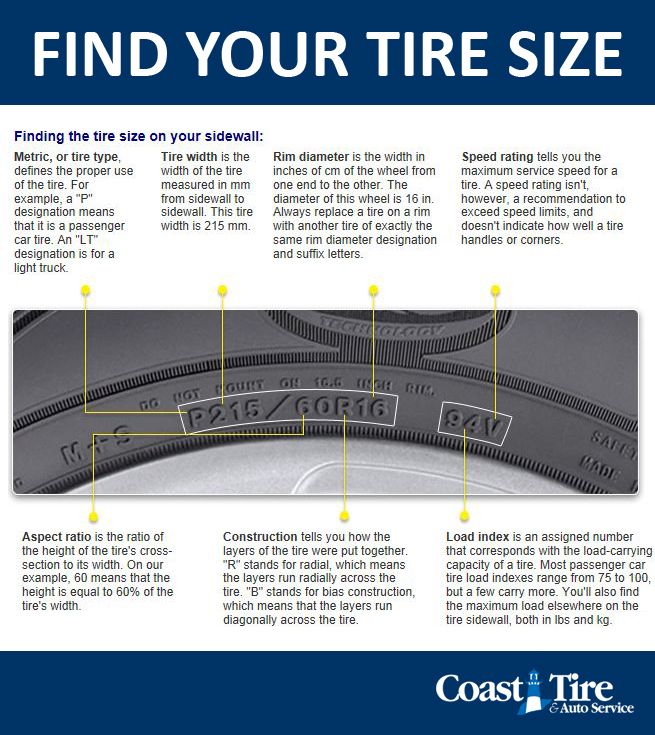 75 x .03937 = 5.5 inches). Then take the inches and multiply by two and add the rim size. Example: 5.5 x 2 + 15 (rim size in inches) = a 26 inch tall tire.
75 x .03937 = 5.5 inches). Then take the inches and multiply by two and add the rim size. Example: 5.5 x 2 + 15 (rim size in inches) = a 26 inch tall tire.
Construction – This indicates how the how the tire was put together and will say much about the tires handling characteristics. R indicates the tire is a radial type tire. For more information about what a radial is, click here. B indicates the tire is a bias ply type tire. For more information about bias ply type tires, click here.
Wheel Diameter – This is the width of the opening in the tire where it would be mounted to a wheel. This is measured from one bead across the opening to the other side of the same bead. This measurement is in inches and an example would be 15 and indicates that this tire is for a 15 inch rim, or wheel.
Load Index – This is a number corresponds to the maximum load in pounds that a tire can support when properly inflated.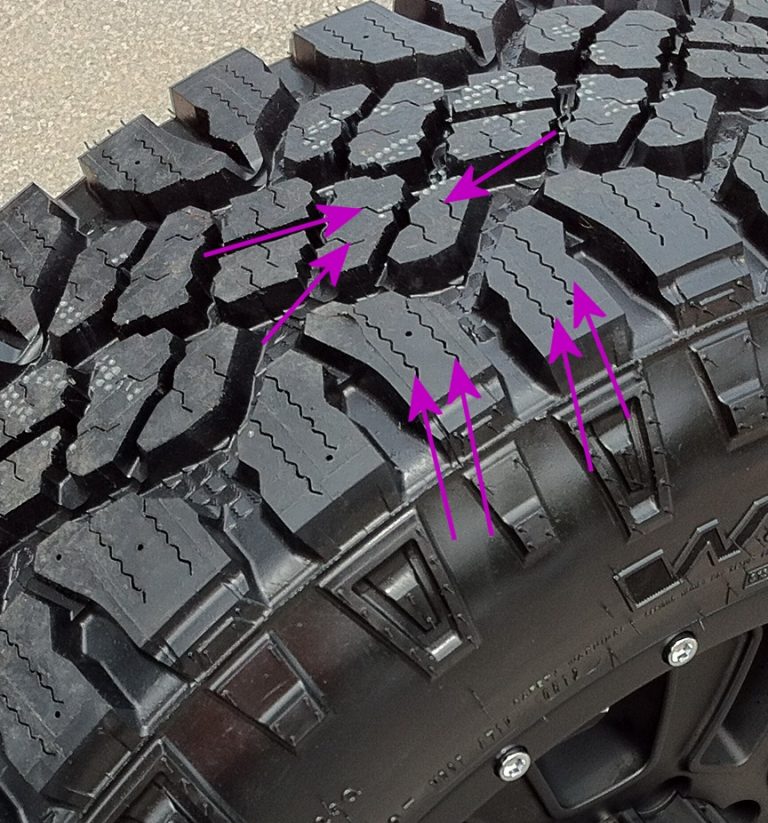 You will also find the maximum load in pounds and in kilograms molded elsewhere on the tire sidewall.
You will also find the maximum load in pounds and in kilograms molded elsewhere on the tire sidewall.
Speed Rating – This is a number that corresponds to the maximum service speed for a tire. See Chart for ratings. Note: Speed ratings are specific for passenger car tires and not light truck tires. Light truck tires (LT) are not speed rated.
Rating | Maximum Speed |
| Q | 99 mph |
| S | 112 mph |
| T | 118 mph |
| U | 124 mph |
| H | 130 mph |
| V | 149 mph |
| W | 168 mph |
| Y | 186 mph |
| Z | Above 149 mph |
Reference
Knowing your Jeep's tire size can be essential information when it comes time to replace that rubber, or even if you ever decide to change wheels.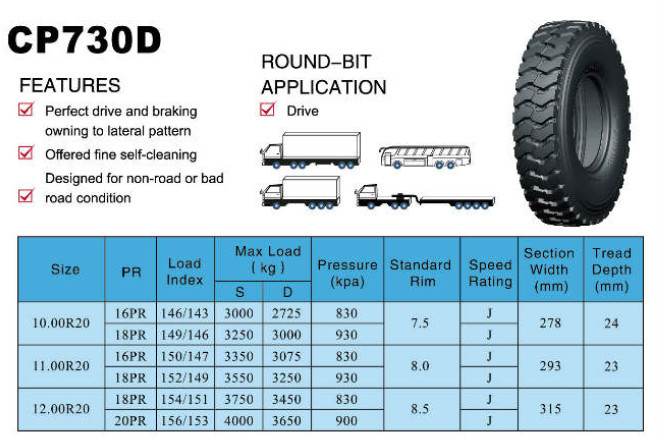 And while a stock tire size is imprinted right inside the driver side B pillar, you may not know what if have if you are not the original owner.
And while a stock tire size is imprinted right inside the driver side B pillar, you may not know what if have if you are not the original owner.
So here is some helpful information to assist you in determining what you currently have on the vehicle.
First, the sidewall of your tire contains all the information needed to understand everything about that specific tire. All tires are required to have this information, regardless of the manufacturer brand name.
Now, this information could read in a few different ways. For example, it could simply say 35x12.5 R17, or it may show as P265 75 R15. If it is the first listing, then here is the breakdown. That first number is your tire size at 35", and then the second number tells you the tire width at 12.5". That third reading is the tire type as radial and diameter as 17".
The second listing is a metric set up, and is what is more common on factory-type sized tires. From left to right, the P indicates a passenger tire while 265 indicates the tires width in millimeters. That 75 is the tire's aspect ratio and simply means the tire's height is equal to 75 percent of its width. Finally, like the first set of numbers, that R15 means it is a radial tire and has a 15" diameter.
That 75 is the tire's aspect ratio and simply means the tire's height is equal to 75 percent of its width. Finally, like the first set of numbers, that R15 means it is a radial tire and has a 15" diameter.
For those who have the metric reading on their tires, you can simply plug that into the conversion calculator to determine the tire size, or find that corresponding reading on one of the below conversion charts.
Enter the metric size (i.e. 285/75 R17)
| Metric | Standard |
|---|---|
| 215/75/15 | 27.7"x 8.5" |
| 225/70/15 | 27.4"x 8.9" |
| 225/75/15 | 28.3"x 8.9" |
| 235/75/15 | 29.0"x 9.3" |
| 245/75/15 | 29.5"x 9.6" |
| 255/75/15 | 30.0"x 10.0" |
| 265/75/15 | 30. 6"x 10.4" 6"x 10.4" |
| Metric | Standard |
|---|---|
| 205/85/16 | 29.7"x 8.1" |
| 215/75/16 | 28.7"x 8.5" |
| 225/70/16 | 28.4"x 8.9" |
| 225/75/16 | 29.2"x 8.9" |
| 235/70/16 | 29.0"x 9.3" |
| 235/85/16 | 31.7"x 9.3" |
| 245/70/16 | 29.5"x 9.6" |
| 245/75/16 | 30.5"x 9.6" |
| 255/70/16 | 30.0"x 10.0" |
| 265/70/16 | 30.6"x 10.4" |
| 265/75/16 | 31.6"x 10.4" |
| 275/70/16 | 31.2"x 10.8" |
| 285/75/16 | 32.8"x 11.2" |
| 295/75/16 | 33.4"x 11.6" |
| 305/70/16 | 33.0"x 12.2" |
| 315/75/16 | 34.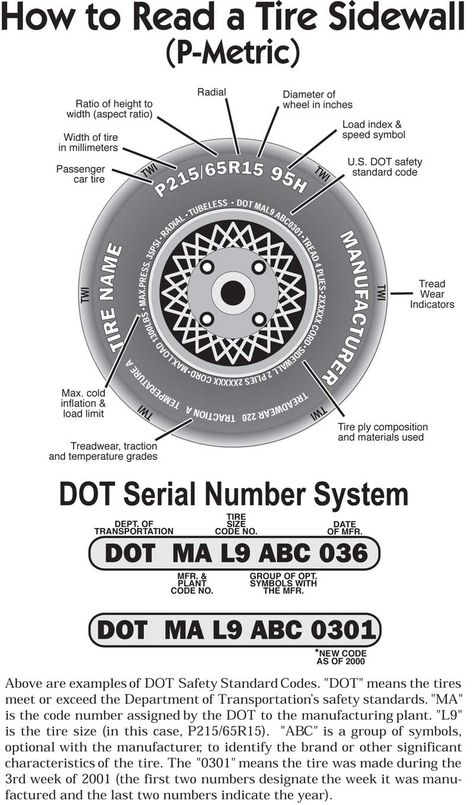 8"x 12.4" 8"x 12.4" |
| 375/55/16 | 32.8"x 15.5" |
| 395/70/16 | 37.9"x 16.0" |
| Metric | Standard |
|---|---|
| 245/70/17 | 30.6"x 9.8 |
| 265/70/17 | 31.6"x 10.7 |
| 285/70/17 | 33.0"x 11.5 |
| 315/70/17 | 34.4"x 12.4 |
| Metric | Standard |
|---|---|
| 275/65/18 | 32.1"x 11.0 |
| 375/50/18 | 33.0"x 15.4 |
| 325/60/18 | 33.2"x 13.3 |
| 325/65/18 | 34.8"x 13.5 |
| 305/70/18 | 35.0"x 12.2 |
| 375/60/18 | 35.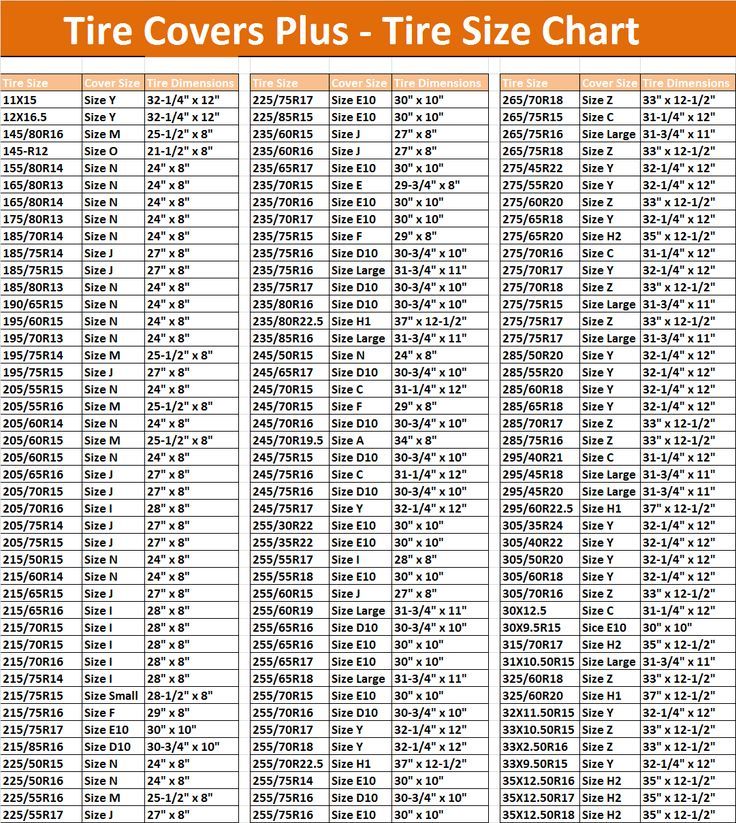 7"x 15.5 7"x 15.5 |
| 395/65/18 | 37.8"x 15.7 |
| Metric | Standard |
|---|---|
| 325/50/20 | 33.0"x 13.2" |
Metric measurement example: 225/70R15
225 = Section width in millimeters
70 = Aspect ratio (ratio of section height to section width)
R15 = Rim diameter
R = Radial Construction, B = Bias Construction, D = Bias Belted Construction
Calculations for Measurements
Tire Width: Section width divided by 25.4 (Ex: 225 / 25.4 = 8.86")
Section Height: Tire width times aspect ratio (Ex: 8.86" x 70% = 6.20")
Overall Diameter: Section height times 2 plus rim diameter (Ex: (6.20" x 2) + 15 = 27.40")
See all tires here
When Is It Time To Change My Jeep's Tires?
Choosing The Best Jeep Tires
How Do You Rotate Jeep Tires?
Tags:
Winter Covered Bridge Ride: Jeep Enthusiasts Of Eastern Pennsylvania
READ MORE
Quadratec Premium 2" Receiver Hitch Install and Review for 2020+ Jeep Gladiator JT
How Do I Know When My Jeep Needs New Tires?
Wear alone isn't the only reason you may need new Jeep tires.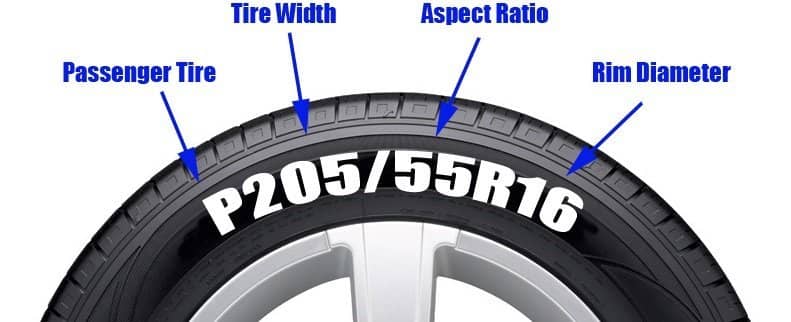 There can be several reasons what you have now needs replacement.
There can be several reasons what you have now needs replacement.
READ MORE
Jeep Unveils the 20th Anniversary Rubicon + AEV Level II Upfit the Most Expensive Wrangler Ever
How To Properly Adjust Your New Jeep LED Headlights
LED headlights can be a great addition to your vehicle. But installing them isn't enough. Proper adjustment of those headlights is crucial for driver safety, as well as visibility.
READ MORE
Jeep Taps Wildlife, Music, 4xe Vehicles for 2023 Big Game Ad
Brand slides electric messaging into commercial as it looks to ramp up North American PHEV offerings over the next few years.
READ MORE
Alpine PSS-24WRA Complete Sound System Upgrade Install for Jeep Wrangler JL & Gladiator JT
Jeep Rolls Out 20th Anniversary Rubicon 392, 4XE At Chicago Auto Show
READ MORE
Jeep Alloy Wheel Buying Guide
Knowing you need new wheels isn't always enough when it comes time for a swap.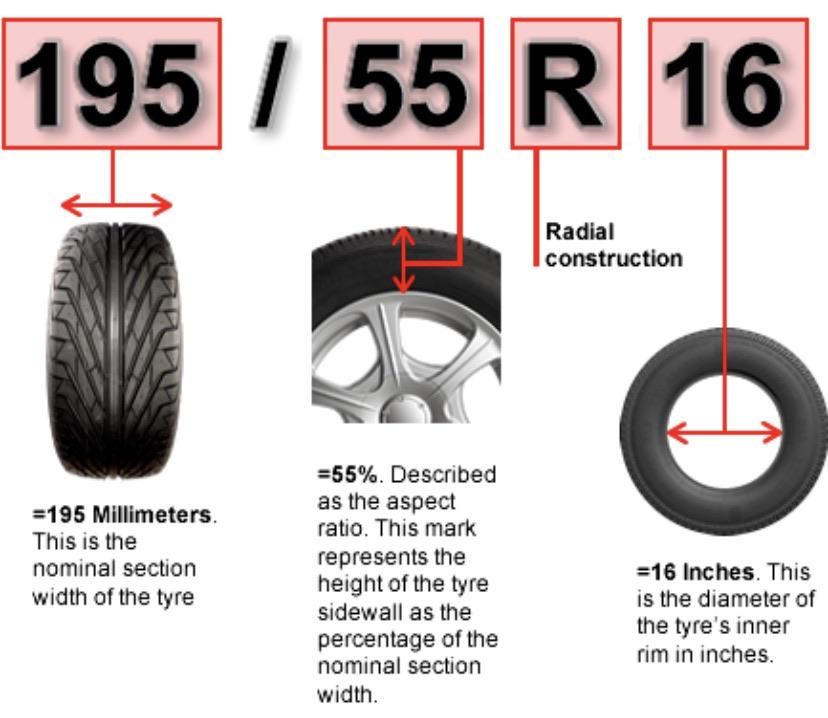 Size, offset, backspacing and even weight should all be considered before making a choice.
Size, offset, backspacing and even weight should all be considered before making a choice.
READ MORE
American and European tires are distinguished by their markings. European tires have a metric marking system. Therefore, when replacing tires, the problem of translating tire parameters may arise. In most cases, this is the conversion of inches to centimeters. Enter the size in inches and click calculate. You will see the tire size in meters (dimensions will be rounded to European parameters).
|
Comparison: inch and meter sizes When you enter the old inch parameters and new European ones, you can see how the external parameters of the tire and ground clearance will change, as well as differences in the speedometer readings. |
|
| ||||||||||||||||||||||||||||||
Thanks to the Tire Calculator, you can do the reverse calculation - convert "cm" and "mm" to inches.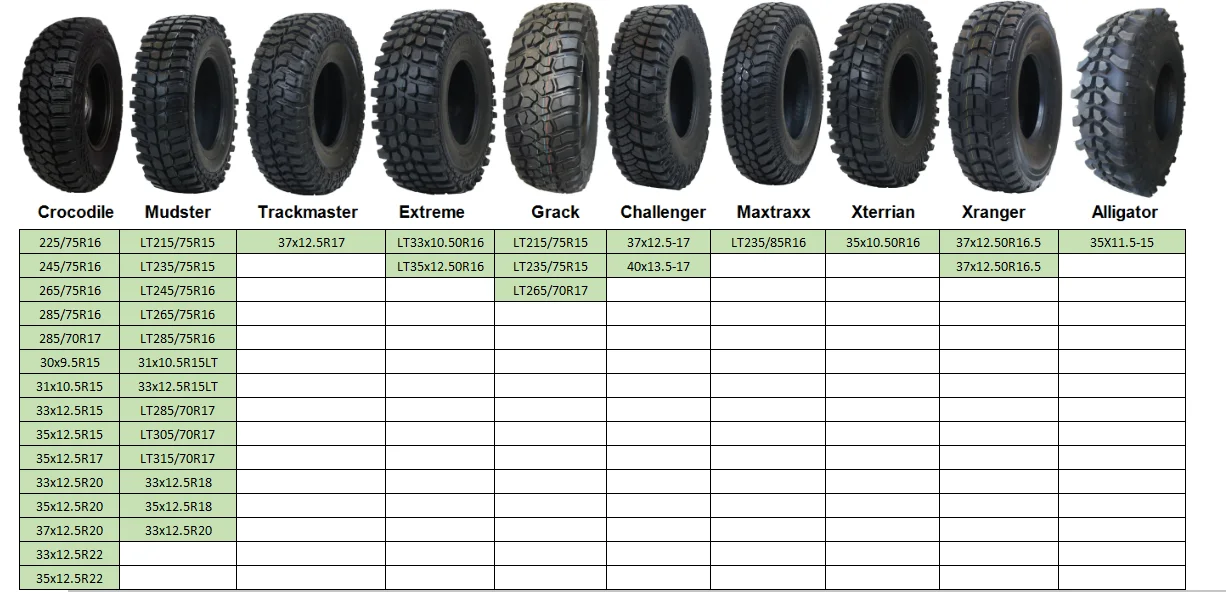 To do this, enter the size, diameter, width and height of the tire profile and click the "calculate" button. The calculator will convert the values to inches.
To do this, enter the size, diameter, width and height of the tire profile and click the "calculate" button. The calculator will convert the values to inches.
| Attention! This R-metric calculator is used to convert European tire size to US tire size. But you can also use it to convert a tire from "inch" style to R-metric. Some dimensions may not be translated correctly (for example, the metric tire dimensions are 33x12.50x15 when converted to R-metric 318/72 R15, but if you translate the dimensions back, you will see 33x12.52x15). This may be due to minor rounding errors. |
Calculate
| |||||||||||||||||||||||||||||||||||||||||||||||||||||||||||
